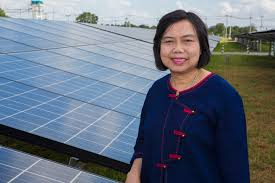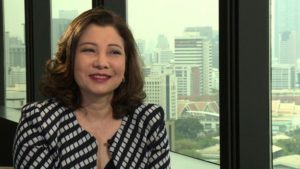
At 60 years old, she’s much older than your typical budding entrepreneur.
Yet in her home country of Thailand she was the first person willing to take a chance on an industry still in its infancy – solar power.
In fact, she was so convinced of the sector’s potential that she came out of retirement to set up her own company.
Thailand, forced to shift away from once-plentiful natural gas reserves, was for the first time ever offering to buy back solar power from private firms.
With enough free time to look into the numbers, and having previously had some experience in the use of solar energy in rural areas, Ms Khunchornyakong felt instinctively that the sector offered a compelling opportunity.
Ultimatum
Yet when she started trying to fund her first solar project, not a single bank was willing to lend her the money, as none of them believed it could be a profitable business.
In frustration she issued an ultimatum to a Thai bank that sported a green logo to indicate support of environmental projects. She insisted that if the bank was not willing to lend her the money it would have to change the colour of its logo.
“He really didn’t want to change the colour of the bank so he agreed to start talking. That’s the way I can convince the management to at least listen.”
Eventually the bank gave her a loan for 60% of the start-up costs, leaving her to find the other 40%.

The newness of solar power in the country meant none of her friends who had invested in her previous business ventures were willing to lend her money so she was forced to use her house as collateral to provide the initial equity to get the business off the ground.
Once the first project proved successful she had a real-life example of how the business worked and the potential profits, helping her secure the help of the World Bank to get further funding to rapidly expand.
Ms Khunchornyakong is now chief executive and chairwoman of the largest solar power firm in Thailand, SPCG. The company she founded has created thousands of jobs and runs 36 solar farms, generating some 260 megawatts of solar power a year.
But what on earth made her take on such a risk when she was comfortably retired?

She says it was simply her conviction that the business was a good idea.
“You have to believe in your own thinking and if you don’t believe your own thinking who else will believe you?”
It’s a lesson she believes anyone, particularly women, can learn from, noting too many are afraid to take a public risk.
Yet in Thailand it seems many women already do. Senior successful high-flying women like Ms Khunchornyakong are far more common than in many other places in the world.
In fact, almost a third of senior business roles in the country are held by females, according to accountancy firm Grant Thornton’s recent study.
The report puts Thailand well above its developed rivals such as the UK, US and Australia in which around a fifth of senior business roles are held by women.

Chadatip Chutrakul, another female Thai chief executive who runs Siam Piwat, a huge shopping mall and real estate enterprise in Thailand, says that historically the country has long treated women and men equally.
“Five hundred years ago we also saved the country together with the men. So that is how it has been carried on.
“If you have good education and if you can prove yourself in everything that you do then there is no limitation. You can move forward in your career.”
Ho Ren Hua, chief executive of Thai Wah Group, a large food products business with operations across Asia, also credits the country’s historical roots for its higher level of equality in business compared to many other countries. He notes that Thailand has long had strong, assertive females, and that many Thai men are therefore comfortable reporting to a female supervisor.
“I think there are strong principles on mutual respect, and maybe it translates to the fundamental history of Thailand with the role of Buddhism and the role of the monarchy that there’s a big adherence to mutual respect.”

It’s a level of equality that firms in other countries are now trying to copy.
Ahmed Fahour, boss of Australia Post, has made a big effort to improve the number of senior women at the firm since he took the helm in 2010.
Like many postal services that have seen the number of letters sent decline sharply as people use email instead, the biggest part of its business is now parcels driven by online shopping.
With 70% of online purchases made by women he says having more females in senior positions isn’t just about fairness, it makes business sense.
“Having a bunch of blokes is not really a smart idea. It is pathetic that we are in the year 2016 and we are having this conversation when there is roughly 50% women, 50% men, and at the same time that is not reflected in the leadership of major corporations.”
‘Just do it’
There is already a whole host of research to support Mr Fahour’s view. Newswire Thomson Reuters found a strong link between mixed gender boards and a better performance for shareholders when it analysed boardroom diversity at 4,100 listed firms and measured their performance between 2008 and 2013.
And Swiss bank Credit Suisse, which looked at the performance of 3,000 companies around the world, concluded that those businesses with at least one woman on the board outperformed those with no women by an average of 2% a year between 2012 and 2014.
When Mr Fahour started at the firm just 19% of management positions were held by women. Now it’s 37%.
“We decided talking about it is not good enough,” he says. “Just do it.”
Source: http://www.bbc.com/news/business-36761788

